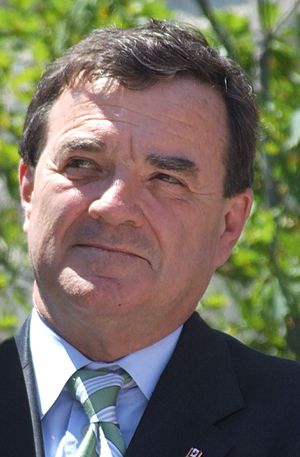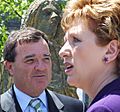Jim Flaherty facts for kids
Quick facts for kids
Jim Flaherty
PC MSC
|
|
|---|---|

Flaherty in 2007
|
|
| Minister of Finance | |
| In office February 6, 2006 – March 18, 2014 |
|
| Prime Minister | Stephen Harper |
| Preceded by | Ralph Goodale |
| Succeeded by | Joe Oliver |
| 6th Deputy Premier of Ontario | |
| In office February 8, 2001 – April 14, 2002 |
|
| Premier | Mike Harris |
| Preceded by | Ernie Eves |
| Succeeded by | Elizabeth Witmer |
| Ontario Minister of Finance | |
| In office February 8, 2001 – April 14, 2002 |
|
| Premier | Mike Harris |
| Preceded by | Ernie Eves |
| Succeeded by | Janet Ecker |
| Member of Parliament for Whitby-Oshawa |
|
| In office January 23, 2006 – April 10, 2014 |
|
| Preceded by | Judi Longfield |
| Succeeded by | Pat Perkins |
| Member of the Ontario Provincial Parliament for Whitby-Ajax (Durham Centre; 1995–1999) |
|
| In office June 8, 1995 – January 23, 2006 |
|
| Preceded by | Drummond White |
| Succeeded by | Christine Elliott |
| Personal details | |
| Born |
James Michael Flaherty
December 30, 1949 Lachine, Quebec, Canada |
| Died | April 10, 2014 (aged 64) Ottawa, Ontario, Canada |
| Political party | Conservative |
| Spouse | Christine Elliott (1986–2014) |
| Children | 3 |
| Alma mater | Princeton University (A.B.) York University (LL.B.) |
James Michael Flaherty (December 30, 1949 – April 10, 2014) was an important Canadian politician. He served as the federal Minister of Finance for Canada from 2006 to 2014. During this time, Stephen Harper was the Prime Minister.
Before working in federal politics, Mr. Flaherty was a Member of Provincial Parliament (MPP) in Ontario. He was first elected in 1995. He held several important jobs in the Ontario government from 1997 to 2002.
As Minister of Finance, he made big changes like cutting the goods and services tax (GST). He also created the Tax-Free Savings Account (TFSA). He helped Canada deal with the 2008 financial crisis. He presented nine federal budgets, which are plans for how the government will spend money.
Mr. Flaherty passed away in 2014, shortly after leaving his role as Minister of Finance. His wife, Christine Elliott, also became a well-known politician in Ontario.
Contents
Early Life and Education
James Michael Flaherty was born on December 30, 1949, in Lachine, Quebec. He was one of eight children. His parents were from New Brunswick.
He went to high school in Montreal. Then, he studied at Princeton University, where he earned a degree in sociology in 1970. He later got a law degree from Osgoode Hall Law School at York University.
After finishing his studies, Mr. Flaherty worked as a lawyer for 20 years. He even helped start his own law firm. This firm focused on cases involving car accidents and personal injuries.
Provincial Politics (1995–2005)
Mr. Flaherty first tried to enter provincial politics in 1990 but was not elected. He ran again in 1995 and won a seat in the Legislative Assembly of Ontario. He represented the area of Whitby.
Important Roles in Ontario
In 1997, he became the Minister of Labour in Premier Mike Harris's government. He held this job until 1999. For a short time in 1998, he also served as the interim Solicitor General.
After being re-elected in 1999, he was named Attorney General. This meant he was the chief legal advisor to the government. In 2001, he took on two very important roles: Minister of Finance for Ontario and Deputy Premier.
Running for Party Leader
Mr. Flaherty twice tried to become the leader of the Progressive Conservative Party of Ontario.
- In 2002, he ran to replace Premier Mike Harris but lost to Ernie Eves.
- In 2004, he ran again but was defeated by John Tory.
After the Conservatives lost the provincial election in 2003, Mr. Flaherty served as the finance critic for his party. This meant he was the main person who questioned the government's financial plans.
Federal Finance Minister (2006–2014)
In 2005, a federal election was called. Mr. Flaherty decided to leave provincial politics and run for the Conservative Party of Canada in the federal election. He won his seat in Whitby—Oshawa.
His wife, Christine Elliott, then won his old provincial seat. This was a unique moment in Canadian history. A husband and wife were representing the same area at different levels of government.
On February 6, 2006, Mr. Flaherty became the federal Minister of Finance. He was also responsible for the Greater Toronto Area. He worked as a Governor for the World Bank and the International Monetary Fund.
He announced he was stepping down from his role as Minister of Finance on March 18, 2014.
Key Financial Changes
As Finance Minister, Mr. Flaherty introduced several important changes:
Tax-Free Savings Account (TFSA)
In 2008, Mr. Flaherty introduced the Tax-Free Savings Account (TFSA). This is a special savings plan that lets Canadians earn money from their investments without paying tax on it. It's different from a Registered Retirement Savings Plan (RRSP) because it's not just for retirement. You can use a TFSA for any savings goal. Many groups supported this idea, calling it a "tax policy gem."
Registered Disability Savings Plan (RDSP)
In 2007, he created the Registered Disability Savings Plan (RDSP). This plan helps Canadians with disabilities and their families save money for the future. The government helps by adding grants and bonds to these savings.
Ending the Penny
In 2012, Mr. Flaherty announced that Canada would stop making the penny. This was because it cost more to make a penny (1.6 cents) than it was worth (1 cent). Getting rid of the penny saved taxpayers about $11 million a year. People can still use pennies if businesses accept them, or they can take them to their bank.
Public-Private Partnerships
Mr. Flaherty was a big supporter of Public-private partnerships (P3s). These are projects where the government works with private companies to build things like roads, bridges, and transit. He believed this was a good way to fund new infrastructure in Canada. A special organization called PPP Canada was created to help with these projects.
Building Canada Plan
In 2013, Mr. Flaherty introduced a new "Building Canada Plan." This plan set aside $53 billion for public infrastructure projects across the country. This money helps build and improve roads, bridges, and other important facilities.
Budgets Presented
Mr. Flaherty presented nine budgets to the Canadian Parliament during his time as Minister of Finance:
- 2006 Canadian federal budget
- 2007 Canadian federal budget
- 2008 Canadian federal budget
- 2009 Canadian federal budget
- 2010 Canadian federal budget
- 2011 Canadian federal budget (presented twice)
- 2012 Canadian federal budget
- 2013 Canadian federal budget
- 2014 Canadian federal budget
Resignation
On March 18, 2014, Mr. Flaherty announced he was resigning from his role as Minister of Finance. He said he wanted to return to working in the private sector. He continued to serve as a Member of Parliament until his death. At the time, he was the longest-serving cabinet minister in the same job in Canada's history.
Honours
An office building in Ottawa where the Department of Finance works is named after Jim Flaherty.
In 2017, after his death, Mr. Flaherty was awarded the Meritorious Service Cross. This honour recognized his work with his wife, Christine Elliott, in creating the Abilities Centre. This centre in Whitby helps people of all ages and abilities take part in sports, arts, and other activities.
Personal Life and Death
Mr. Flaherty grew up in a Catholic family in Montreal. He was partly of Irish background. When he was young, he loved hockey and even got a scholarship to play at Princeton University.
People who worked with Mr. Flaherty as a lawyer said he was very determined and worked hard. He also volunteered for several causes, including being the president of the Head Injury Association of Durham Region.
His wife, Christine Elliott, was also a politician in Ontario. They lived in Whitby and had three sons: John, Gaelen, and Quinn, who were born in 1991. Both Mr. Flaherty and his wife were strong supporters of issues for children with disabilities, as their son John has a disability.
In his later years, Mr. Flaherty's health changed, and he gained weight. He passed away on April 10, 2014, at his home in Ottawa. He was 64 years old. A state funeral was held for him in Toronto on April 16, 2014.
Images for kids
 | William L. Dawson |
 | W. E. B. Du Bois |
 | Harry Belafonte |



